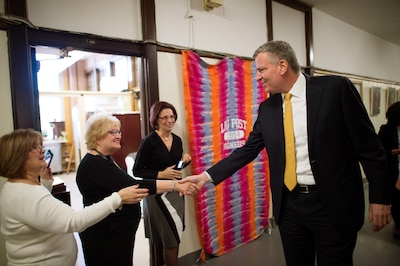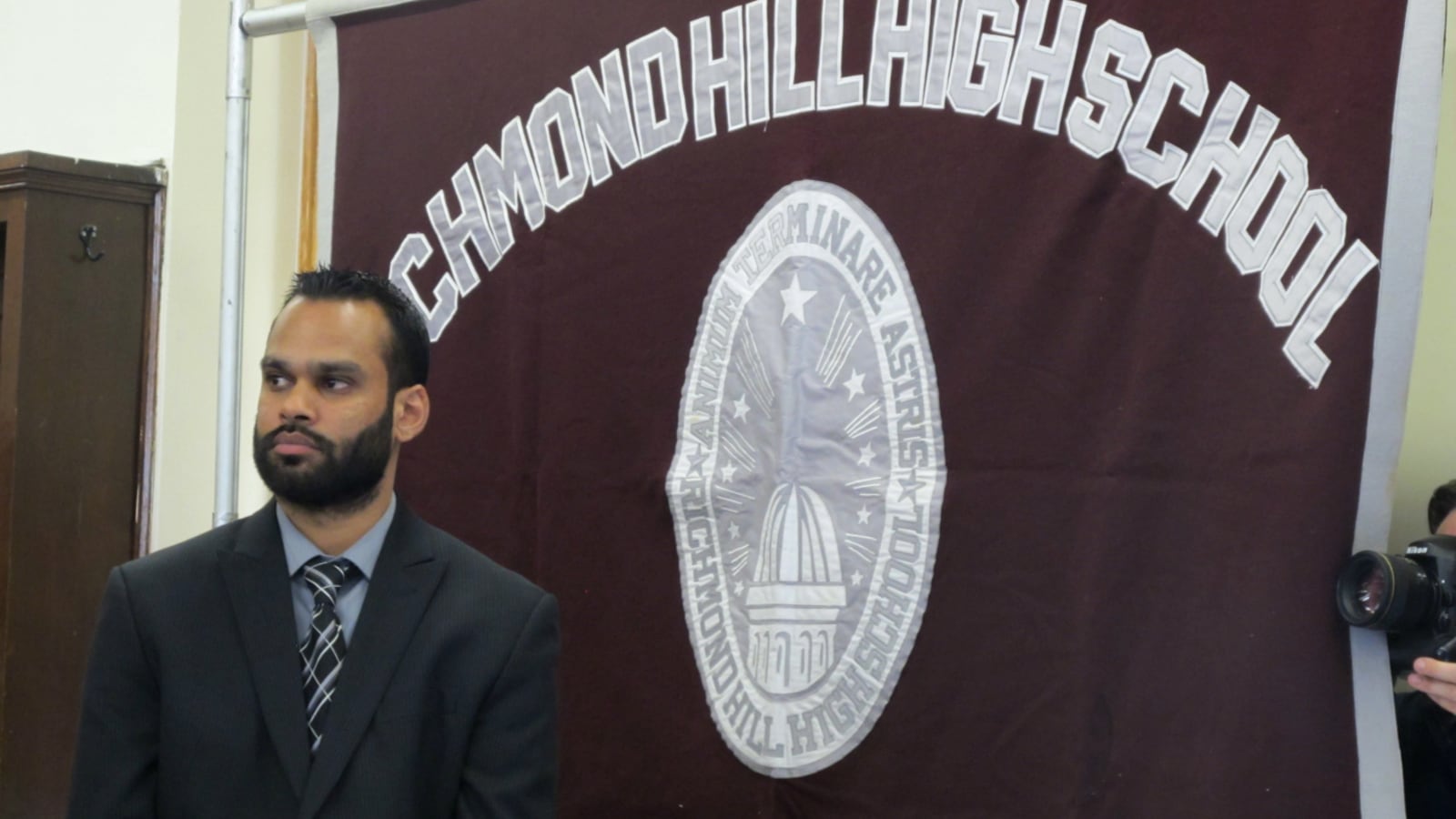Soon after the anonymous letter appeared in some staff mailboxes last week at Richmond Hill High School in Queens, it began to circulate among teachers and students, who found a copy that had been left in the school library.
The mayor had stood in that library just weeks earlier when he visited the long-struggling school to hail its progress within his new school-improvement program and praise its second-year principal, Neil Ganesh. But the letter told a much darker story.
Ganesh “obliterated” trust at the school, “ripped” a popular assistant principal from her English classroom, and forced out other longtime administrators through “relentless bullying,” charged the letter signed by “concerned staff members.” The letter also claimed that Ganesh gave preferential treatment to former colleagues he hired, failed to prevent student bullying and violence, and took credit for improvements that began before his tenure.
Staff members were soon debating whether the authors had crossed a line by publicly and anonymously making such accusations, and whether they might derail the momentum and desperately needed good publicity from the mayor’s visit. This week, teachers union officials held a members-only meeting at the school to “clear the air,” as the school’s union representative put it.
Interviews with over 20 Richmond Hill staffers and students reveal a more complicated situation than the one portrayed in the letter. They described a school where discipline problems remain and suspicion lingers as a novice principal finds his footing, but where new policies are showing promise and a sense of hope for the school’s future is sprouting.
At the same time, the letter has brought into sharp relief a nagging question posed by Mayor Bill de Blasio’s “Renewal” turnaround program: Can school leaders produce rapid improvements at low-performing schools by working with their existing staffers, even if some of those educators are wary of the changes?
It also exposes the strain felt by the educators and administrators at those schools, who the mayor has said have just two more years to make major gains or face closure.
“That’s a huge amount of pressure,” said Charles DiBenedetto, an English teacher who is the school’s union representative. “There are times I want to come home and scream because I feel so beat.”
A new principal gets pushback
When Ganesh arrived at Richmond Hill in fall 2013, the second new principal in two years, the 2,300-student school was floundering, several people said. Fights were common, many students skipped class, and seniors sometimes learned days before graduation that they had too few credits to graduate.

“It was a school that was out of control,” said Vishnu Mahadeo, executive director of the Richmond Hill Economic Development Council and the school’s former parent association president.
Ganesh, who worked at nearby Jamaica High School before it closed and was raised in Richmond Hill, began to strictly enforce the school rules — so much so that the school gave out the most suspensions of any school in the city last year. According to the letter and sources at the school, three assistant principals have either been been removed or pressured to leave since Ganesh arrived, and several teachers have left or been moved from their classrooms. (Sources said city officials took two teachers out of their classrooms because they are under investigation.)
Staffers who are critical of Ganesh, who spoke on the condition of anonymity to avoid retaliation, said he has failed to communicate his vision for the school. One teacher said the administration was playing a “gotcha game,” searching for misconduct to document, and that some teachers’ ratings went down this year. Echoing the letter, another staffer complained that several people who have been hired from the Jamaica High School campus receive special treatment.
Ganesh referred questions to the education department press office. A spokeswoman said Ganesh is committed to communication and treating staff fairly, and that he is working to create an environment where all educators meet his high expectations.
“Turning around a struggling school is difficult work, and requires difficult decisions,” said spokeswoman Devora Kaye. “Schools need to have the right leadership, and each leader must work hard to ensure their students have the high quality assistant principals and teachers they need to raise achievement.”
Teachers take sides
Some teachers see the school moving forward under Ganesh. To them, the anonymous letter seemed unprofessional and unproductive, the work of a small group of disgruntled staffers.
“This was a specific plan to sensationalize a certain faction’s feelings,” said Christine Rossiello, a science teacher who has worked at Richmond Hill for 18 years and worries that the letter could detract from the school’s recent progress. “I don’t want people messing up Richmond Hill’s chance to be successful for a change.”
A history teacher who came to the school this year from the Jamaica High School campus said certain teachers have discussed the letter with students in order to “divide the school and create a chaotic situation.”
“Students are coming up to me and asking, ‘How did you get here? Who brought you here?’” the teacher said. “I have never been in an environment like this where I’ve seen this kind of dirty politics and teachers sharing this kind of information with students.”
The tensions come as Ganesh tries to spearhead a new type of school transformation.
Under Mayor Michael Bloomberg, the city closed many struggling schools and replaced them with new schools and different teachers. Bloomberg also tried to replace at least half the staff members at two-dozen troubled schools, including Richmond Hill, but was blocked by a labor arbitrator.
By contrast, de Blasio’s turnaround program aims to overhaul chronically low-performing schools by giving their existing staffers more training and resources. While many Richmond Hill teachers have embraced the program and Ganesh’s new policies, some have resisted, said Mahadeo, the former parent-association president.
“For the first time,” he said, “the teachers in this school are actually being asked to do the job they are paid to do.”
Along with extra resources for the school, the Renewal program also brings added oversight. Officials now regularly visit the school, fueling anxiety among some staffers that they are constantly being evaluated. Others are suspicious that the retired principal sent to coach Ganesh is acting as a “puppetmaster,” as one teacher put it.
Teachers on all sides seem to agree that Ganesh could better explain his ideas and what the Renewal program means for the school.
“There needs to be more communication,” said English teacher Daniel Garretson. “A lot of teachers feel stressed and uncertain.”
Shoots of ‘green’
While few would say Richmond Hill has undergone a complete reversal since Ganesh took over, several teachers and students said it has taken a sharp turn in the right direction.

One of his first moves was to get staffers to share and analyze student data. Then he created a color-coded system for students called “Are You Green?” that tracks their earned credits, passed Regents exams, detentions, and attendance rate, which he posted throughout the school (using ID numbers instead of names to protect student privacy).
Guidance counselors seek out students who fall out of the green zone and, through an “Adopt a Senior” initiative, staffers are responsible for guiding off-track students to graduation. Students who are behind are sent to after-school or lunchtime tutoring, or attend evening or Saturday classes. While the school’s graduation rate still lags far below the city average and actually fell in Ganesh’s first year from 58 to 52 percent, the number of students on track to graduate has increased 7 percentage points since last year, officials said.
Meanwhile, reported violent incidents are down and suspensions had fallen by 72 percent in March from that time last year, from 444 to 126. However, the cause of the declines is up for debate.
The letter said fights and theft continue, but the administration is not reporting them. A teacher said one student who recently attacked a classmate got off without a suspension, while another who smelled like marijuana was sent back to class.
“They’re trying to make the numbers look better,” she said. “The teachers have no recourse.”
But other teachers said the school is just following the city’s updated discipline code, which restricts the offenses that warrant suspensions. Some students said the school’s new detention system seems harsh and arbitrary — one girl said she currently has 26 unserved detentions for offenses like being late to lunch or violating the dress code. But several students also said the school generally feels safer under Ganesh.
“There are less incidents,” said senior Tyquan Desilva. “I think the school’s getting better.”
As Ganesh enacts his policies, the school is also benefitting from its placement in a high-priority group within the Renewal program that has received the most help so far. The city gave it money to expand the Saturday classes, assigned it four on-site math and literacy coaches for teachers, and trained the ninth-grade teachers in a writing program that has been used to revamp low-performing schools.
“Obviously there are some issues here,” said Rossiello, the longtime science teacher. “But there are hundreds of people who work here every day to make sure Richmond Hill is on the up and up.”

